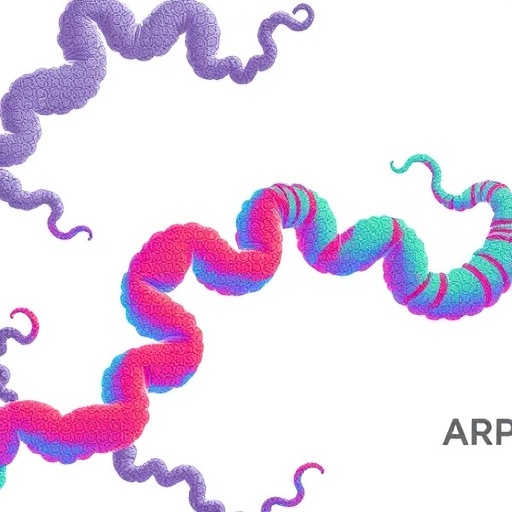In a groundbreaking study published in Genes & Immunity, researchers have identified and characterized a founder mutation responsible for ARPC1B deficiency, a rare yet debilitating immunodeficiency disorder. This discovery unveils new molecular insights and advances our understanding of the genetic underpinnings and immunological consequences underpinning this condition. The study’s detailed analysis highlights how alterations in the ARPC1B gene contribute to immune dysfunction, paving the way for innovative diagnostic and therapeutic strategies.
ARPC1B deficiency has increasingly garnered attention due to its complex immunological presentations, which include combined immunodeficiency, severe infections, thrombocytopenia, and allergic manifestations. Despite previous reports linking ARPC1B mutations to these clinical features, the molecular mechanisms remained elusive. This study addresses that gap by meticulously dissecting a founder mutation—a genetic anomaly arising in a single ancestor and propagated through descendants—shaping the landscape of ARPC1B deficiency in affected populations.
The investigators employed a comprehensive molecular approach encompassing genomics, transcriptomics, and proteomics to unravel the effects of the mutation at multiple biological layers. By directly sequencing patient-derived samples and leveraging cutting-edge bioinformatics, they pinpointed a specific nucleotide alteration that disrupts ARPC1B expression and function. The mutation was demonstrated to cause aberrant splicing events, yielding truncated and non-functional protein products, which in turn compromise the actin regulatory complex critical for immune cell motility and signaling.
Immunologically, ARPC1B is a pivotal component of the Arp2/3 complex, essential for orchestrating cytoskeletal dynamics within hematopoietic cells. Deficiency in ARPC1B leads to impaired formation of branched actin networks, undermining immune synapse formation and lymphocyte proliferation. Through flow cytometry and functional assays, the authors documented profound defects in T-cell activation and dendritic cell migration, which collectively explain the immunodeficiency and heightened infection susceptibility observed clinically.
A particularly striking aspect of the study is its focus on the founder mutation’s epidemiological footprint. The mutation appears enriched in discrete ethnic communities with shared ancestry, corroborated by haplotype analyses and pedigree reconstructions. This suggests a common origin dating back several generations, emphasizing the importance of population genetics in unmasking disease risk and guiding precision medicine initiatives.
Beyond the molecular and immunological characterizations, this investigation delved into clinical repercussions, illustrating the mutation’s association with severe phenotypes including early-onset infections and auto-inflammatory manifestations. The authors advocate for heightened clinical vigilance and early genetic screening in at-risk populations, proposing that prompt diagnosis could mitigate long-term morbidity through tailored interventions like hematopoietic stem cell transplantation.
The work further contributes to the expanding catalog of primary immunodeficiencies, reinforcing how single-gene mutations can have outsized effects on immune homeostasis. By delineating ARPC1B’s role, the study also informs the broader immunological field about the critical interplay between cytoskeletal integrity and immune competence, revealing new angles for therapeutic targeting.
In terms of methodology, the research harnessed advanced next-generation sequencing platforms and CRISPR-based gene editing models to validate the mutation’s functional impact in vitro. These innovations provided detailed mechanistic insights, confirming that restoring ARPC1B expression could rescue defective immune phenotypes, thereby underscoring the potential for gene therapy applications.
Intriguingly, the study also sheds light on the interplay between the identified mutation and environmental factors influencing disease severity. The complex gene-environment interactions described hint at why phenotypic variability exists among carriers, highlighting an intricate balance between genetic predisposition and external immune challenges.
The findings hold implications beyond immunology, as ARPC1B-related pathways intersect with other cellular processes including cell migration, adhesion, and tissue repair. Understanding these intersections opens avenues for multidisciplinary research spanning immunology, cell biology, and regenerative medicine.
Importantly, this research sets a precedent for studying founder mutations in rare genetic disorders. It exemplifies how integrating molecular genetics with immunological phenotyping and epidemiology can unravel pathogenic mechanisms that were previously inscrutable, ultimately fostering personalized medicine tailored to genetic contexts.
Looking forward, this study lays a foundation for future investigations aimed at developing targeted therapeutics that can modulate ARPC1B function or compensate for its deficiency. Such strategies might include small molecules to enhance cytoskeletal assembly or biologics to correct immune dysregulation, potentially transforming patient outcomes.
In conclusion, the molecular analysis and immunological characterization of a founder mutation causing ARPC1B deficiency represents a milestone in understanding rare immunodeficiencies. By bridging genetic discovery and clinical implications, this work not only illuminates a critical immune pathway but also offers hope for patients grappling with this challenging condition.
Subject of Research: Molecular genetics and immunological characterization of a founder mutation causing ARPC1B deficiency.
Article Title: Molecular analysis and immunological characterization of a founder mutation causing ARPC1B deficiency.
Article References:
Dobrose, M.M., Kars, M.E., Perez-Caraballo, J.J. et al. Molecular analysis and immunological characterization of a founder mutation causing ARPC1B deficiency. Genes Immun (2025). https://doi.org/10.1038/s41435-025-00368-w
Image Credits: AI Generated
DOI: 17 November 2025
Tags: ARPC1B deficiencybioinformatics in genetic researchcombined immunodeficiency conditionsfounder mutation insightsgenetic underpinnings of ARPC1Bgenomics and transcriptomics studyimmune dysfunction mechanismsimmunodeficiency disorder researchinnovative diagnostic strategiesmolecular characterization of mutationstherapeutic approaches for immunodeficiencythrombocytopenia and allergies





